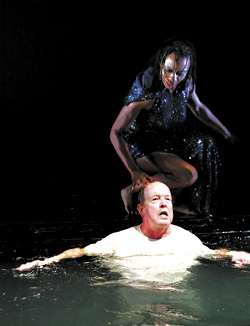 R.U.R.
R.U.R.
Karel Capek’s 1920 play, the speculative dystopia R.U.R., gave to the modern world the term “robot,” derived from the Slovakian word robata meaning, literally, serf labor and implying “drudgery” or “hard work.” That bit of immortality aside, what’s amazing, and a bit disturbing, is how little this story of robot workers rebelling against their creators has aged.
Directed by Seattle Scenic Studios education director Walter Baker, Open Circle’s production sets R.U.R. in the eternal here and now, and treats Capek’s play without a trace of self-defeating irony or quaint sarcasm. Or, at least, not in the first act. Full disclosure: I was so ill Saturday night (chills, fever) that I left, reluctantly, at intermission.
From what I saw, this is pretty much a straight-up adaptation. As the play opens, R.U.R. (or Rossum’s Universal Robots) President Harry Domin (the excellent John McKenna) is introduced in his office to Helena Glory (Beth Peterson), the daughter of one of the company’s iconic founders. The romance—as well as the conflict—that develops between these two protagonists fuels the plot. Personifying the early-20th-century faith in technology and progress (with a capital P), Harry believes his work-ready androids will liberate mankind and pave the way for a better tomorrow. Helena, a bighearted humanist, feels on the other hand that the robots, despite their supposed lack of sentiment and emotion and even physical sensation, are being exploited egregiously. When a large-scale riot traps several members of the company in corporate headquarters, surrounded by machines of their own making, it becomes increasingly difficult to believe that some naive idea of progress will save the day.
Open Circle’s production moves at a snappy pace. With her deep, husky voice and slightly camped-up gestures, Peterson re-creates the aura of a 1940s screen starlet. Also noteworthy is Aaron Allshouse in the role of company technician Alquist, a man whose faith in progress is eroded by his concern for the soul of man. Open Circle should be lauded for reviving this important though rarely staged classic, familiar to most of us only as the three-letter answer in a New York Times crossword puzzle.








